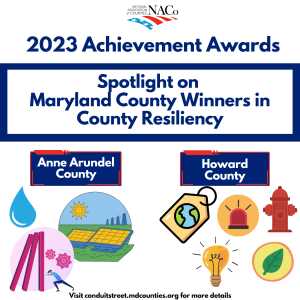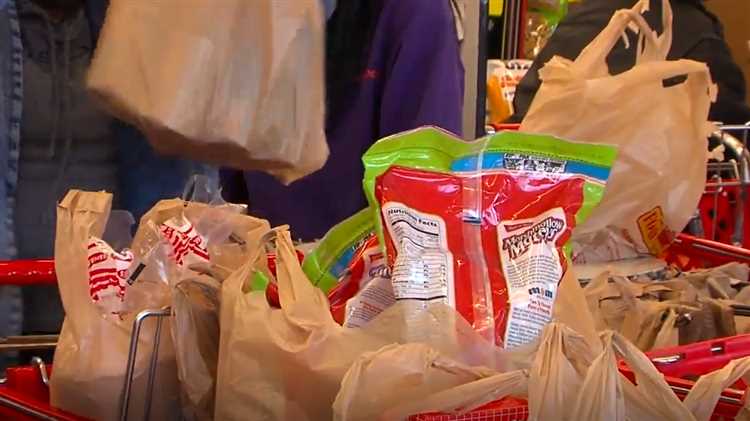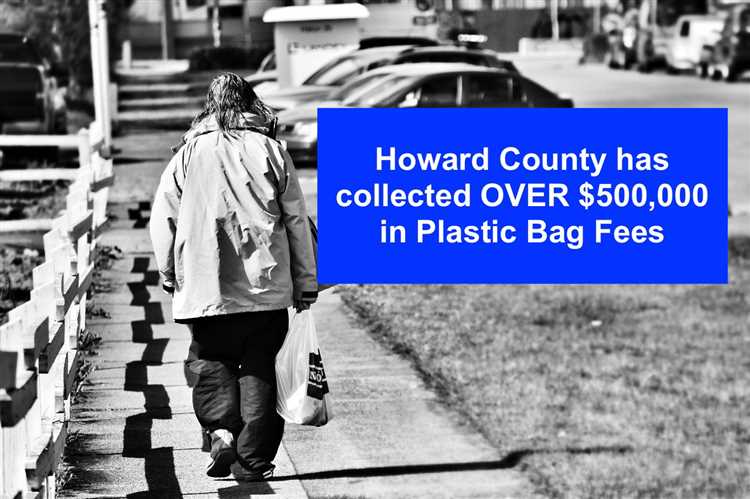
If you’re a resident or visitor in Maryland, it’s important to be aware of the bag fees that may be imposed in different counties. The aim of these fees is to promote sustainability and reduce plastic waste. By discouraging the use of single-use bags, Maryland counties are taking steps towards a more eco-friendly future.
Montgomery County, for example, has implemented a bag fee of 5 cents per bag for both plastic and paper bags at all retail establishments. This fee, known as the “Bag Tax,” was introduced in 2012 and has successfully reduced the use of disposable bags. The revenue generated from the bag fee is used to support local environmental initiatives and programs.
Baltimore County is another Maryland county that has adopted bag fees. As of 2020, a fee of 5 cents per bag is charged for disposable bags, including plastic and paper, at most retail establishments. There are exemptions for certain types of bags, such as those used for packaging bulk items or prescription drugs. The revenue collected from this fee is directed towards environmental restoration projects in Baltimore County.
Prince George’s County has also joined the movement towards reducing plastic waste. They have implemented a bag fee of 5 cents per bag for both plastic and paper bags. The revenue generated from the bag fee is allocated towards litter reduction and recycling programs. Similar to other counties, there are exceptions for bags used for certain products, such as meat or produce.
It’s important to keep in mind that these bag fees are not meant to be a burden, but rather a way to encourage individuals to make more sustainable choices. By bringing your own reusable bags or opting for fewer bags, you can help protect the environment and contribute to the well-being of Maryland’s counties.
- Understanding Bag Fees in Maryland Counties
- Overview of Bag Fees
- Benefits of Bag Fees
- Implementation and Enforcement
- Benefits of Bag Fees
- Charges and Exemptions
- Local Initiatives for Waste Reduction
- Impact on Consumers and Retailers
- Future of Bag Fees in Maryland
- Q&A,
- Are there bag fees in Maryland counties?
- Why do Maryland counties charge bag fees?
- How much are the bag fees in Maryland counties?
- Do all stores in Maryland counties charge bag fees?
Understanding Bag Fees in Maryland Counties
Bag fees have become a common practice in many states and counties as a way to reduce plastic waste and encourage the use of reusable bags. Maryland is one such state that has implemented bag fees in several of its counties.
The bag fees vary from county to county in Maryland, so it’s important to understand the specific regulations in your area. Here are a few key points to keep in mind:
- Montgomery County, Maryland: In Montgomery County, a bag fee of 5 cents is charged for each paper or plastic bag provided by retailers. This fee applies to all retail establishments, including grocery stores, restaurants, and convenience stores.
- Prince George’s County, Maryland: Prince George’s County also has a bag fee of 5 cents for each paper or plastic bag provided by retailers. Similar to Montgomery County, this fee applies to all types of retail establishments.
- Frederick County, Maryland: Frederick County does not currently have a bag fee in place. However, the county encourages residents to use reusable bags whenever possible to reduce waste.
It’s important to note that the bag fees in Maryland are intended to encourage the use of reusable bags rather than to generate revenue. The collected fees are typically used to support environmental initiatives and education programs.
While bag fees may seem like a minor inconvenience, they play an important role in reducing plastic waste and protecting the environment. By being aware of and understanding the bag fees in your county, you can make an informed decision about how to reduce your own impact on the environment.
Overview of Bag Fees

Bag fees have become a common topic of discussion in Maryland counties as part of efforts to reduce waste and promote sustainability. Several counties in the state have implemented bag fees or bans as a way to encourage residents to use reusable bags and reduce the use of single-use plastic bags.
Bag fees typically apply to grocery stores, convenience stores, and other retail establishments that provide bags to customers. The fees are usually charged per bag and can range from a few cents to a few dollars. The exact amount of the fee and the types of bags that are included vary by county.
Benefits of Bag Fees
Bag fees have several benefits for both the environment and communities. By charging a fee for single-use plastic bags, counties are able to reduce the amount of waste that ends up in landfills and waterways. This helps to protect wildlife and preserve natural resources.
Bag fees also encourage residents to bring their own reusable bags when shopping, which can save money in the long run. Reusable bags are more durable and can be used multiple times, reducing the need for single-use bags.
Implementation and Enforcement
The implementation and enforcement of bag fees vary by county. Some counties have passed legislation to require stores to charge bag fees, while others have implemented voluntary programs. Many counties rely on self-reporting by retailers to ensure compliance with the bag fee requirements.
County governments use the revenue generated from bag fees to support recycling and waste reduction efforts, as well as educational programs to raise awareness about the importance of reducing plastic waste.
It is important for residents and visitors to be aware of bag fees in their county and to bring their own reusable bags when shopping to avoid the additional fees. By working together, we can all make a difference in reducing plastic waste and creating a more sustainable future for Maryland.
Benefits of Bag Fees

Implementing bag fees in Maryland counties offers several benefits:
- Reduced Plastic Waste: Bag fees encourage consumers to bring their own reusable bags, reducing the amount of single-use plastic bags that end up in landfills or as litter in the environment. This helps to protect wildlife and preserve natural habitats.
- Environmental Conservation: By reducing the consumption of single-use plastic bags, bag fees help conserve non-renewable resources, such as petroleum, which is used in the production of plastic bags. This promotes a more sustainable and environmentally-friendly approach to managing waste.
- Financial Incentive: Bag fees provide a financial incentive for consumers to adopt more sustainable habits by encouraging them to bring their own reusable bags. This not only saves them money on bag fees but also encourages a shift towards a more sustainable lifestyle.
- Support for Local Businesses: Bag fees can benefit local businesses by encouraging consumers to purchase reusable bags from them. This creates a new market for reusable bag sales, driving economic growth and supporting local businesses.
In conclusion, bag fees in Maryland counties offer numerous benefits by reducing plastic waste, promoting environmental conservation, providing a financial incentive for sustainable practices, and supporting local businesses. These fees are an effective way to encourage a shift towards more eco-friendly habits and contribute to a cleaner and greener future.
Charges and Exemptions
Under the bag fees implemented in Maryland counties, customers are charged a fee for each disposable bag they use at eligible retailers. The fee is typically a few cents per bag and is added to the total cost of the purchase.
However, there are certain exemptions to the bag fees that customers should be aware of. These exemptions include:
- Reusable Bags: Customers who bring their own reusable bags are exempt from the bag fees. This encourages customers to reduce their use of disposable bags and opt for more sustainable alternatives.
- Small Businesses: Small businesses with less than a certain square footage are exempt from the bag fees. This exemption recognizes the challenges that small businesses may face in implementing bag fee programs.
- Specific Types of Bags: Certain types of bags, such as those used for prescription medication or bulk items, may be exempt from the bag fees. These exemptions ensure that customers have access to necessary items without incurring additional fees.
- Low-Income Individuals: Some counties may provide exemptions or reduced fees for low-income individuals who may face financial hardship due to bag fees. These exemptions help ensure that the bag fees do not disproportionately burden vulnerable communities.
It’s important for customers to be aware of these exemptions and understand how they apply to their specific situation. By encouraging the use of reusable bags and providing exemptions for certain circumstances, Maryland counties aim to reduce the environmental impact of disposable bags while minimizing the impact on consumers.
Local Initiatives for Waste Reduction
Many counties in Maryland have implemented local initiatives aimed at reducing waste and promoting sustainability. These initiatives include:
- Reusable Bag Programs: Several counties have implemented programs to encourage residents to use reusable bags instead of single-use plastic bags. These programs often include providing free or discounted reusable bags to residents, education campaigns to promote their use, and partnerships with local businesses to incentivize customers to bring their own bags.
- Recycling Programs: Counties have established comprehensive recycling programs to encourage residents to recycle a wide range of materials, including paper, plastics, glass, and metals. These programs often include curbside collection services, drop-off centers, and educational resources to help residents understand what can and cannot be recycled.
- Composting Programs: Some counties have implemented composting programs to divert organic waste from landfills. These programs provide residents with composting bins or offer composting services at designated locations. Composting can help reduce methane emissions and create nutrient-rich soil that can be used in landscaping and gardening.
- Food Recovery Programs: To reduce food waste, some counties have launched food recovery programs. These programs work with local restaurants, grocery stores, and other food establishments to collect and redistribute excess food to those in need. Food recovery programs not only help reduce waste but also address food insecurity in the community.
- Education and Outreach: Counties are investing in education and outreach efforts to raise awareness about waste reduction and sustainability practices. These initiatives include workshops, informational materials, and partnerships with local schools and community organizations to promote recycling, composting, and other sustainable behaviors.
Through these local initiatives, Maryland counties are making significant strides in waste reduction and promoting a more sustainable future for their communities.
Impact on Consumers and Retailers
The implementation of bag fees in Maryland counties has had a significant impact on both consumers and retailers. Consumers now have to pay a fee for each bag they use, which has led to a change in their shopping habits. Many consumers have started bringing their own reusable bags to avoid paying the fees, resulting in a decrease in the use of plastic bags.
This shift towards reusable bags has had a positive impact on the environment as it reduces the amount of plastic waste generated. Plastic bags are known to be non-biodegradable and can take hundreds of years to decompose, causing harm to wildlife and natural habitats. By encouraging consumers to use reusable bags, the bag fees have helped in reducing plastic pollution and promoting sustainability.
However, the bag fees have also presented challenges for retailers. Initially, some retailers experienced a decrease in sales as consumers were hesitant to pay the bag fees. However, over time, retailers adapted their strategies and began offering incentives to customers who brought their own bags. This included discounts or loyalty points, which not only encouraged customers to bring their own bags but also increased customer loyalty.
The bag fees have also prompted retailers to explore alternative packaging options. Many retailers have started offering biodegradable or compostable bags as an alternative to plastic bags. This has not only helped in reducing plastic waste but has also positioned retailers as environmentally conscious businesses, attracting eco-conscious customers.
In summary, the implementation of bag fees in Maryland counties has had a positive impact on consumers and the environment. It has encouraged consumers to adopt reusable bags, resulting in a decrease in plastic waste. While initially challenging for retailers, they have adapted to the new regulations by offering incentives and exploring alternative packaging options. Overall, the bag fees have promoted sustainability and environmental consciousness among consumers and retailers alike.
Future of Bag Fees in Maryland
The implementation of bag fees in Maryland counties has been met with mixed reactions from residents and businesses. While some see it as a positive step towards reducing plastic waste and promoting environmental sustainability, others argue that it adds an unnecessary burden on consumers and small businesses.
Despite the controversies surrounding bag fees, their future in Maryland is uncertain. Some counties have already implemented bag fees, while others are still considering it. The effectiveness of bag fees in reducing plastic waste and changing consumer behavior is still being studied and debated.
One possible future scenario is that more Maryland counties will adopt bag fees in an effort to reduce plastic waste. As awareness about the environmental impact of plastic pollution grows, there may be increasing public support for bag fees as a means to encourage the use of reusable bags.
Alternatively, there may be a pushback against bag fees, with residents and businesses advocating for their removal. This could lead to a repeal of bag fee ordinances in certain counties or even at the state level.
It is also possible that the future of bag fees in Maryland will depend on the outcome of legal challenges. Some opponents of bag fees argue that they are unconstitutional or unfairly burden certain businesses. If these legal challenges are successful, bag fees may be struck down in some jurisdictions.
Regardless of the future of bag fees in Maryland, it is clear that the issue of plastic waste and its environmental impact will continue to be a topic of concern and debate. Finding sustainable alternatives to single-use plastic bags will be an ongoing challenge for policymakers and businesses alike.
It remains to be seen whether bag fees will become a permanent fixture in Maryland or whether they will eventually be phased out in favor of other solutions. The future of bag fees in Maryland will depend on a variety of factors, including public opinion, legal challenges, and the effectiveness of bag fees in reducing plastic waste.
Only time will tell what the future holds for bag fees in Maryland.
Q&A,
Are there bag fees in Maryland counties?
Yes, there are bag fees in some Maryland counties. This means that customers have to pay a fee for using plastic bags at stores.
Why do Maryland counties charge bag fees?
Maryland counties charge bag fees as a way to reduce plastic waste and encourage the use of reusable bags. Plastic bags are harmful to the environment and can take hundreds of years to decompose. By charging a fee, counties hope to incentivize people to bring their own bags or use more environmentally-friendly options.
How much are the bag fees in Maryland counties?
The bag fees vary depending on the county. Some counties charge a flat fee of 5 cents per bag, while others have a higher fee of 10 cents per bag. It is best to check with the specific county for the exact bag fee amount.
Do all stores in Maryland counties charge bag fees?
No, not all stores in Maryland counties charge bag fees. The bag fees only apply to certain types of stores, such as grocery stores, convenience stores, and retail stores. Some stores, such as restaurants and pharmacies, may be exempt from the bag fees.